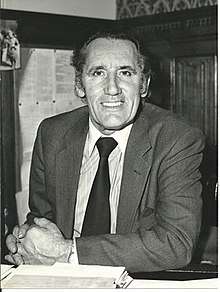Walter Harrison (politician)
Walter Harrison PC (2 January 1921 – 19 October 2012) was a British Labour politician.[1]
Walter Harrison | |
|---|---|
 Harrison when Deputy Chief Whip in the 1970s | |
| Treasurer of the Household and Deputy Chief Whip | |
| In office 4 March 1974 – 4 May 1979 | |
| Monarch | Elizabeth II |
| Prime Minister | Harold Wilson James Callaghan |
| Member of Parliament for Wakefield | |
| In office 15 October 1964 – 11 June 1987 | |
| Preceded by | Arthur Creech Jones |
| Succeeded by | David Hinchliffe |
| Personal details | |
| Born | 2 January 1921 |
| Died | 19 October 2012 (aged 91) |
| Nationality | British |
| Political party | Labour |
Biography
Harrison was educated at Dewsbury Technical College and School of Art. He was a foreman electrician and was active in the Electrical Trades Union. He served as a councillor on West Riding County Council and as an alderman of Castleford Borough Council.
Elected Labour MP for Wakefield in 1964, Harrison served as a Government whip from 1966 to 1970 and as deputy Chief Whip from 1974 to 1979. On one occasion in 1968, Harrison was whipping on two bills simultaneously, trapping his leg in the door of a division lobby on the second vote; famously ruling that most of Harrison's body was in the lobby, the chairman of the bill committee declared the vote passed 22¾–22 in Labour's favour.[2] In the Conservative landslide at the 1983 general election, he held his seat - which had undergone substantial boundary changes - with a majority of only 360 votes over the Conservative candidate.
Harrison retired from parliament in 1987. He died on 19 October 2012, aged 91.
Role in 1979 vote of no confidence
On 28 March 1979, Harrison played a critical role in the defeat of the Labour government in the vote of confidence. As the vote loomed, Harrison approached Conservative MP Bernard Weatherill to enforce the convention and "gentlemen's agreement" that if a sick MP from the Government could not vote, an MP from the Opposition would abstain to compensate. The Labour MP Sir Alfred Broughton was on his deathbed and could not vote, meaning the Government would probably lose by one vote.[3]
Weatherill said that the convention had never been intended for Matter of Confidence and it would be impossible to find a Conservative MP who would agree to abstain. However, after a moment's reflection, he offered that he himself would abstain, because he felt it would be dishonourable to break his word with Harrison. Harrison was so impressed by Weatherill's offer – which would have effectively ended his political career – that he released Weatherill from his obligation and so the Government fell by one vote on the agreement of gentlemen.[4]
This episode was dramatised in James Graham's 2012 play This House (which opened one month before Harrison's death). When the play was first performed at the National Theatre, the part of Harrison was played by Philip Glenister.[5][6]
References
- "Former Labour whip Harrison dies". PoliticsHome. Archived from the original on 31 January 2013. Retrieved 21 October 2012.
- "Walter Harrison". 22 October 2012. ISSN 0307-1235. Retrieved 4 June 2020.
- "Early election as Callaghan defeated". BBC News. 28 March 1979. Archived from the original on 27 June 2009. Retrieved 2 June 2009.
- The Night the Government Fell, BBC archive on the 1979 vote of confidence, audio interview of Weatherill and Harrison
- Finnis, Alex (29 May 2020). "Everything you need to know about This House on National Theatre at Home". iNews. Retrieved 30 May 2020.
- "Former Wakefield MP Walter Harrison dies aged 91". www.wakefieldexpress.co.uk. 22 October 2012. Retrieved 3 June 2020.
Sources
External links
- Hansard 1803–2005: contributions in Parliament by Walter Harrison
| Parliament of the United Kingdom | ||
|---|---|---|
| Preceded by Arthur Creech Jones |
Member of Parliament for Wakefield 1964 – 1987 |
Succeeded by David Hinchliffe |
| Political offices | ||
| Preceded by Bernard Weatherill |
Treasurer of the Household 1974–1979 |
Succeeded by John Stradling Thomas |